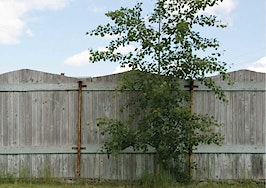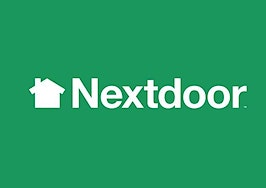- Now five years old, Nextdoor is looking for ways to monetize, which may include advertising opportunities for real estate agents.
- Nextdoor has a presence in nearly 70 percent of all the neighborhoods in the country, approximately 100,000 total.
- Agents and all business are discouraged from promoting themselves on Nextdoor currently, but you can make connections and establish yourself as a market expert.
“You don’t want to ruin it with ads because ads aren’t cool,” a member of Facebook’s early inner circle argues in The Social Network.
This line, as a cinematic portrayal of the dilemma facing “Thefacebook” founders before it blew up, represents the crux of so many internet startups: knowing when and how to turn vanity metrics like registered users into revenue (without scaring off dedicated followers).
Twitter, launched in 2006, didn’t announce paid advertising through “promoted tweets” until 2010. The ad hold-off lasted about a month for Facebook, but its 1.71 billion users have watched the social media giant’s promotion offerings mature and gain targeting sophistication.
Real estate agents contend with a similar struggle on an individual scale, careful not to let consumers smell the sales vibes too soon.
Now, venture-capital backed Nextdoor is on the edge of that revenue tipping point.
The “free and private social network for neighborhoods” has raised over $210 million total from funders and staked a presence in nearly 70 percent of all neighborhoods in the country.
Co-founder and CEO Nirav Tolia confirmed that he is actively searching for ways to monetize the site, which just passed its five-year anniversary. He is approaching the process cautiously, with real estate agents (who have patiently lingered as active users) positioned to get a slice of the pie.
Agents preserve Nextdoor’s purity
However, not all in Nextdoor land are thrilled about the potential changes coming to the site.
California agent Cathy Daniel was one of the early real estate agents to be a “lead” or coordinator with Nextdoor.
Introduced to the network by her mother, also a Realtor, Daniel has always been strict on keeping to the rules of not allowing anyone (agents, insurance salespeople, you name it) to promote their businesses on the site.
As far as she’s concerned, this is a website where town criers announce that they have lost their dog, neighbors collectively try to track down a child who is late home from school and people start cooking up casseroles upon hearing that Mr. Smith’s wife is in the hospital.
“I never promote my business on Nextdoor,” said Daniel. “If I did, it wouldn’t be genuine.”
When she started out, Daniel sent out 14 postcards to neighbors to join; now, she says it’s one of the biggest Nextdoor hubs with more than 500 members.
“We are a town of 57,000, and I feel like I live in the smallest big town in the world,” she said. “There is an opportunity for everyone to get to know each other.”
Though she doesn’t have “Realtor” next to her name on the community site, the connections and conversation alone help her stay top-of-mind with her neighbors.
And some put two and two together. A listing came to Daniel indirectly through the site thanks to an attorney who, after following Daniel’s Nextdoor activity for several years, recognized that she played by the rules.
When the Nextdoor steward is told there might be advertising on Nextdoor in the future, her hackles rise.
“That worries me; it takes the genuineness out of Nextdoor because it then becomes one more way to advertise,” she said.
“I know quite a few people who are frustrated with Facebook ad marketing. People don’t do it anymore because of the ads. I would not want to see that happen with Nextdoor.”
Nirav Tolia on monetizing Nextdoor
But after receiving tens of thousands of inquiries from agents about advertising on the hyperlocal site, Tolia is factoring them into the equation.

Nirav Tolia, Nextdoor co-founder and CEO
“We are testing ideas for advertising and see a potential for real estate agents to contribute valuable content for our members,” he said.
The company, which has already started testing sponsored content from a select group of businesses, says that any advertising it brings onto the platform will create a better way for members to discover the businesses and service providers that serve their communities.
“We don’t believe that Nextdoor is a new environment or some kind of innovative environment; it’s an online version of what goes on in local communities.”
As such, the San Francisco-based tech company has partnered with more than 1,700 public agency partners, including police departments, fire departments, offices of emergency management and mayor’s offices.
When it comes to the private sphere, those local enterprises that have claimed their Nextdoor business page (a feature released in 2015) on Nextdoor can see the neighborhoods where they have been recommended by Nextdoor members, an update that users heard about via email in October.
(With the update, a business is limited to seeing a member’s photo, first name, last initial and neighborhood name if that person chooses to share their identity with that business.)
Businesses now can also receive private messages, but in line with Nextdoor’s record of church-state separation, they cannot reach out to members proactively.

A future of MLS integration?
Tolia is increasingly convinced that real estate content is good content for neighbors on Nextdoor.
There are many different elements that make up a healthy community, and neighbors are the most important, he said.
He says that existing listings, open houses, homes sold and trends in home value are all things that Nextdoor perceives not as advertising but as “valuable content” for the neighbors who interact on the platform.
Although he stresses that there are no definitive plans yet, Tolia has some ideas about how neighbors and agents might begin making more direct connections on the site without it becoming a consumer sales marketplace — and the possibility of a future that involves MLS listing information.
“It’s information all readily available from MLSs; it’s easy to get hold of — so we are thinking about, how do we match that content with the best real estate agents in the area,” Tolia said. “We are not talking about, ‘here’s a house for sale,’ but ‘here’s the agent, here are some suggestions from agents who can help you buy.’”
For example, in a hypothetical Nextdoor ad, an agent could talk about what he or she likes about the neighborhood; it might also include comments from neighbors about them. Tolia notes the possibility of different formats, including the buzzword of 2016: video.
The hyperlocal nature of Nextdoor
With over 100,000 neighborhoods on Nextdoor (and over 100 neighborhoods launching their sites every day), you could say that the site has reached that “cool” threshold, if families, public service organizations, businesses (and lost pets!) cite its usefulness.
Questions like, “Anyone know a good roofer?” — which real estate agents are particularly well-trained to answer — populate the neighborhood news feeds and are now giving way to the natural next step of paid advertising that Twitter, Facebook and Instagram have already taken.
This time, there’s a local twist.
Indeed, more stories are emerging of business coming indirectly from Nextdoor for agents, though at this point, these deals arise as happy accidents.
Gene Montemore, founding member and lead of Nextdoor McCormick Ranch (one of the largest Nextdoor websites in the Phoenix area) said it has been a labor of love for him, but he has benefited indirectly.
The head of Central Scottsdale Real Estate helped a family purchase a home, and then they went on the Nextdoor site that he had recommended and wrote him a quick review, saying he helped them out and was great.
“There is nothing quite like it,” he said. “There is nothing else on a real hyperlocal level like this,” he said.
The introduction of ads has been successfully accomplished with other social networking sites without too much fuss.
Whether Nextdoor can do so without donning a pair of dad jeans seems likely (it was valued at $1.1 billion in the latest funding round, and so far, its users are loyal), but the implementation will be a delicate dance.
“I am skeptical about how they will roll it out,” Montemore said. “Nextdoor has trained members not to commercialize postings, to make it a comfortable place to come to as a neighbor and not be spammed.”
“I would hate to see 30 percent of members get hit with ads and not come back.”









